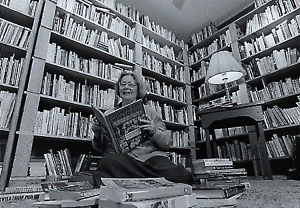

[ Sonoma Independent | MetroActive Central | Archives ]
Shakespeare's Sisters
Bibliomania: Sonoma State English professor J.J. Wilson has co-founded a reader's sanctuary of thousands of fine books.
Cotati's Sitting Room offers a place of one's own
By Gretchen Giles
Wanna be seduced? Forget about overripe women spilling tightly through their clothes, and overmuscled fabulous Fabios. Forget about that box of overlooked chocolates that only you know about.
Think instead about books. Think about a few large and comfortable rooms filled with nothing but well-written novels, literary journals, reference books, and original art. Think about old chairs that have been sat in so often that they fit just right. Think about softened-down lights and the distant sound of others busying themselves outside--a sound that has nothing to do with you, because you have found a place of solace and comfort.
Think about the Sitting Room.
Housed in a Cotati storefront, the Sitting Room is a common person's lending library and reading room from which people can borrow books on the honor system, close a door and write on an sturdy old typewriter, lie down on a pallet and look up at the ceiling in silence, or make coffee and chat.
Based on the principles outlined in Virginia Woolf's essay A Room of One's Own and stressing the importance of women finding enough income and solitude if they are to write, the Sitting Room isn't much to look at from the outside. But the inside is magic.
Founded by Sonoma State University English professor J. J. Wilson and Santa Rosa Junior College librarian Karen Peterson some 15 years ago with the profits from a book entitled Women's Art that they co-authored in 1976, the Sitting Room is a private library that anyone "without 'vandal' written across their T-shirt," may have a key to, laughs the handsome, expansive Wilson.
There are no charges, no fines, no librarian.
To gain access to this sanctuary, one simply calls Wilson or Peterson to arrange to get a key, lets oneself in, puts out the sandwich board announcing the place, reads or works, cleans up one's own mess, locks up, and leaves.
This is a place where grownups are expected to act grown-up.
And they do.
"We had a couple of different ideas on how to spend the money that would plow it back into the women's movement," Wilson says, explaining the Sitting Room's genesis. "And I think that that's when we realized that the women's movement was here to stay, and that we were going to need a place to gird our loins and to get information and evaluate and rest." Funded by royalties, donations, and volunteers, the Sitting Room is unlike ordinary libraries. Eating and talking are encouraged, and with few exceptions, the books are organized solely by author.
"We didn't want to separate the books into subject categories," Wilson says, "partly because we just felt that women's stuff--we have books by men here, too, by the way; we just emphasize women's work--is so inconsistently cataloged. You can't tell if a book is mythology, sociology, psychology, or wishful thinking. This way, people come in and browse the shelves, and often they think that they're coming in just to get sci-fi or something, but will go away with some more interesting books that just happen to be next to the others."
While the Sitting Room is known for its extraordinary collection of rare feminist pamphlets--to the extent that feminist poet Adrienne Rich makes an annual pilgrimage from Stanford University with her students to introduce them to these artifacts--this is not a stuffy place where you can squint over only high-minded literature.
"We do have Danielle Steel," Wilson admits. "We try to be unbiased. We believe in escape reading, and we believe in not being too pompous, [ending up with] a library of excellent but unread books. But we do exercise some selectivity--i.e., censorship. I mean, there's no getting around it. If something is about the abuse of women in an exploitative way rather than an analytical, let's-get-out-of-this-phase way, we toss it in the trash."
Wilson and Peterson had originally envisioned a "dear little Victorian house" for the Sitting Room. Instead, it is situated in a low, squat building that formerly housed a travel agency. But Wilson is pleased. "If we'd had our [Victorian]," she explains, "it would have been sort of neo-hippie-looking, and some people wouldn't have felt happy.
"But it is its blandness and normality, and the fact that it doesn't pitch to any one audience, that really reflects what we think about the Sitting Room, which is that there's something for everybody to find here, from Danielle Steel to esoteric poetry, to the political material from the early women's movement, to the wonderful old books that show that feminism is not a new thing but a recurrent phenomenon.
"We really did not intend it to be an 'in-the-loop' thing. It's not just for lesbians, it's not just for straights, it's not just for academic people.
"No one has ever had a Sitting Room before," Wilson sighs happily. "We've invented a new genre here, and I wish that there were one in every community."
This page was designed and created by the Boulevards team.

Photo by Janet Orsi
The Sitting Room is located at 107 East Cotati Ave. in Rohnert Park. Hours are as you like it, although they prefer that visitors not stay too late, as it upsets the security guards. For keys or information, or to be added to the Sitting Room's mailing list, which delineates upcoming events, call J. J. Wilson. 795-9028 .
From the Jan. 11-17, 1996 issue of the Sonoma Independent
Copyright © 1996 Metro Publishing and Virtual Valley, Inc.